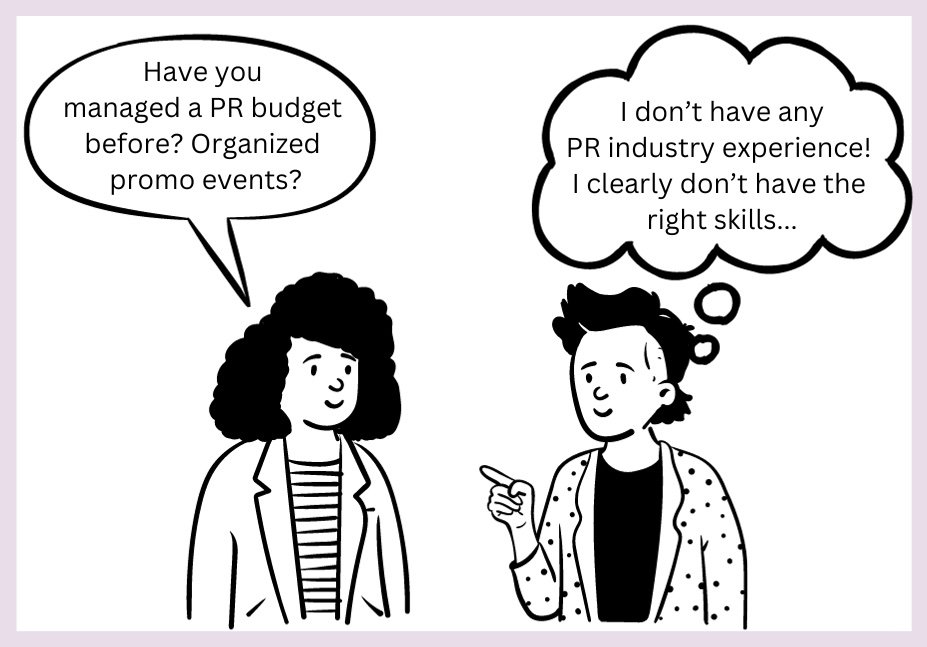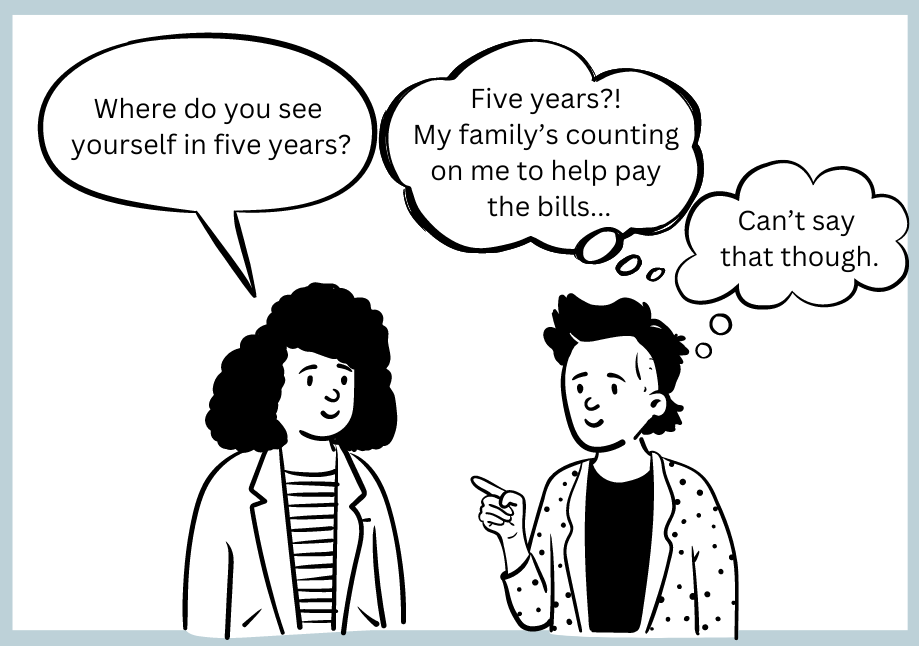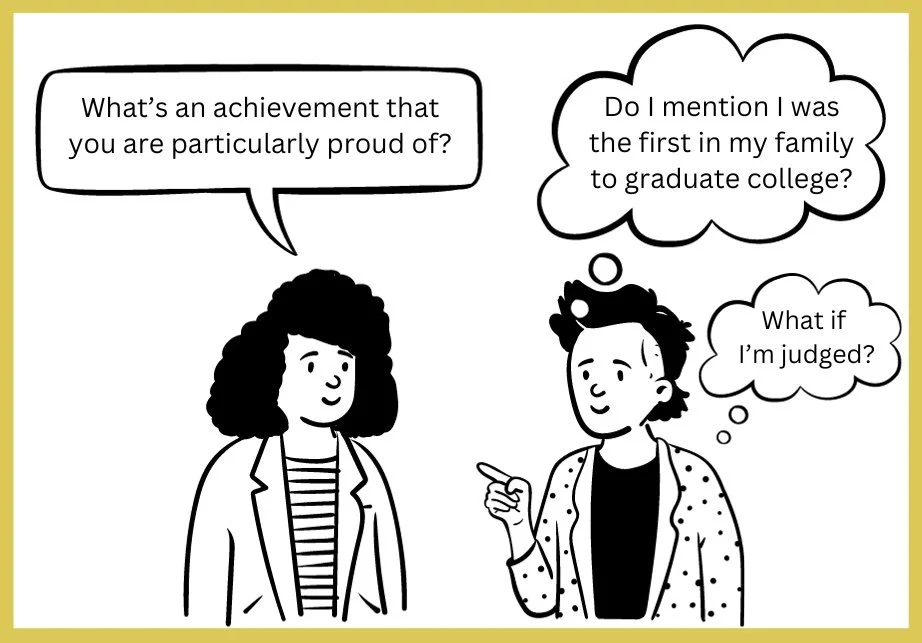Elevate Your Hiring Game—Tips for Interviewing First-Gen Talent
First-Generation Professionals give companies a crucial edge — they’re 32 percent more likely to be loyal to their employers and 40 percent more likely to be intrinsically motivated.
Yet among entry-level talent, they’re also 21 percent less likely than their peers to interact with alumni at potential companies during job searches1. Without connections and guidance from experienced parents, FGPs can feel less self-confident and knowledgeable during interviews. In a survey, 63 percent of first-gen students were concerned about their ability to connect with recruiters during interviews 2, 3. Greg Marchi, an FGP and Baem research participant, shared:
“When I did job interviews, and all through my career, I didn't have parents to go to and say, ‘Hey, give me advice.’ I had to make all those decisions on my own.…When I got out of school, my whole desire was, ‘Man, I just want to have an office at a building and maybe be a vice president someday.’ That was it. That was all I knew. My dad was a fireman, and my mom was a technician at the hospital. They didn't know anything about that.”
FGPs frequently face bias in the interview process.
Surveys indicate employers prefer those from elite universities, which perpetuates preference for affluent backgrounds and higher family educational levels 6. According to research, hiring managers agreed that “generally, students from lower socioeconomic-status backgrounds are not as well equipped to succeed in business 7.” The bias was traced, at least in part, to a “deficit mindset” in those who were screening applicants. Despite their resilience, first-gen candidates are often evaluated through a biased perspective that emphasizes what they lack, rather than recognizing the distinctive strengths that enabled them to overcome challenges 8.
How can companies ensure equitable, inclusive interviewing of FGPs?
Data suggests that when focusing on a candidate’s strengths, hiring managers can be nearly twice as receptive to considering first-gen candidates.
Similar to job descriptions that are often written with the intent to eliminate candidates, so are the questions asked in interviews. Here’s how to redesign questions for inclusivity and ensure exceptional first-gen candidates don’t go unnoticed:
Look for strengths, not shortcomings.
Shifting to a strength-based interviewing approach means recognizing talents and abilities that might not be evident through traditional markers such as GPA or work history. Questions that uncover strengths paint a more holistic view of an individual and are often phrased to highlight positive experiences and attributes. This encourages candidates to reflect on the qualities and skills that are valuable in the role for which they’re applying. Consider questions like:What would people who know you say you are good at doing?
Tell me what a really good day looks like for you. What makes it good?
What are your sources of motivation?
- Center on capabilities rather than industry-specific experience.
Forty percent of internships are unpaid, and paid internships disproportionately go to male, white, and continuing-generation students9,10. Instead, FGPs are more likely to have navigated the challenges of commuting, managed family commitments, and worked throughout college—and possess a wealth of practical experiences11. Exploring these experiences through open-ended questions can provide insights into a candidate’s problem-solving skills and approach toward tasks. Consider questions like:- Can you tell me of an instance when you had a problem and didn’t know what to do?
- Can you describe a time when you suddenly changed a job or situation?
- Ask, “How would you approach doing x or y or z?” rather than “Have you done x or y or z?”
Consider how certain questions could cause unease for FGPs.
Asking “Where do you see yourself in five years?,” for example, can lead to bias against FGPs who may be focused on more immediate needs such as supporting their family. Similarly, questioning “Why do you believe you’re the ideal candidate for this position?” can be uncomfortable for FGPs lacking traditional backgrounds or those who struggle to advocate for themselves because of cultural norms that discourage self-promotion. Instead, questions such as “What personal qualities do you possess that you believe are helpful for this role?” can encourage candidates to share examples of traits that they see as relevant to the role.
- Create a sense of belonging from the start.
One study showed FGPs are 19 percent less likely to say they can be themselves at work, and they often hesitate to discuss their backgrounds during interviews because they fear stereotypes or judgment12, 13. But many actually want to share their first-gen identity because they feel their achievements contribute to their capabilities14. As one Baem research participant shared, “It’s the ‘get it done’ mentality [that has led me] to be the most successful.” Similarly, another Baem research participant shared how her life experience being first-gen has translated professionally:
“It’s being driven, and trying to demonstrate to my family and friends that I could make it in New York and make it in the U.S. and finish my college degree.…I have all these fears about me and about my background...or the language barrier or the things that I say. [An interviewer may assume] I might not be as great as someone born here or [who looks] different than me. But I can do it…It's more like a personal internal drive.”
While you should of course steer clear of delving into a candidate’s private details or sensitive information, highlighting diversity and inclusion in the company can create an interview atmosphere where FGPs may feel more encouraged to share their backgrounds. Asking about achievements highlights the person’s strengths while uncovering their motivations and values. Consider questions like:
What is an achievement, professional or personal, that you are particularly proud of? What made it significant to you?
What energizes you?
Recognizing the unique strengths of First-Gen Professionals can be a game changer for acquiring new talent. How will your organization adapt its interviewing approach to spot and benefit from what FGPs have to offer?
Resources
1
"Hiding in Plain Sight: First-Generation Professionals." Boston Consulting Group, April 2023. https://web-assets.bcg.com/49/9c/184a60f14ed9b17f8fabfd7c9d6c/hiding-in-plain-sight-first-generation-professionals-bcg-study.pdf2
Do First-Gen College Grads Face Bias in the Job Market?" Stanford Graduate School of Business, 20 July 2023. https://www.gsb.stanford.edu/insights/do-first-gen-college-grads-face-bias-job-market3
"3 Strategies to Recruit and Support First-Gen College Grads." Harvard Business Review, 28 February 2023. https://hbr.org/2022/02/3-strategies-to-recruit-and-support-first-gen-college-grads4
"3 Strategies to Recruit and Support First-Gen College Grads." Harvard Business Review, 28 February 2023. https://hbr.org/2022/02/3-strategies-to-recruit-and-support-first-gen-college-grads5
"Unpaid Internships and the Need for Federal Action." National Association of Colleges and Employers, May 2023. https://www.naceweb.org/about-us/advocacy/position-statements/position-statement-us-internships/6
"First-Generation College Grads Face More Hurdles in the Job Market." Wired, 24 February 2021. https://www.wired.com/story/first-generation-college-grads-hurdles-job-market/7
"The Consequences of Revealing First-Generational Status." The Institute for Operations Research and the Management Sciences, 20 July 2023. https://pubsonline.informs.org/doi/abs/10.1287/orsc.2023.1682?journalCode=orsc8
Do First-Gen College Grads Face Bias in the Job Market?" Stanford Graduate School of Business, 20 July 2023. https://www.gsb.stanford.edu/insights/do-first-gen-college-grads-face-bias-job-market9
"3 Strategies to Recruit and Support First-Gen College Grads." Harvard Business Review, 28 February 2023. https://hbr.org/2022/02/3-strategies-to-recruit-and-support-first-gen-college-grads10
"Unpaid Internships and the Need for Federal Action." National Association of Colleges and Employers, May 2023. https://www.naceweb.org/about-us/advocacy/position-statements/position-statement-us-internships/11
"First Gen Grads Getting Less Out of Their Job Search, Research Says." Georgetown University "The Feed", 1 October 2021. https://feed.georgetown.edu/access-affordability/first-gen-grads-getting-less-out-of-their-job-search-research-says/12
"Hiding in Plain Sight: First-Generation Professionals." Boston Consulting Group, April 2023. https://web-assets.bcg.com/49/9c/184a60f14ed9b17f8fabfd7c9d6c/hiding-in-plain-sight-first-generation-professionals-bcg-study.pdf13
"Do first-gen college grads face bias in the job market?". Science X, 24 July 2023. https://phys.org/news/2023-07-first-gen-college-grads-bias-job.html14
"Do First-Gen College Grads Face Bias in the Job Market?" Stanford Graduate School of Business, 20 July 2023. https://www.gsb.stanford.edu/insights/do-first-gen-college-grads-face-bias-job-market


